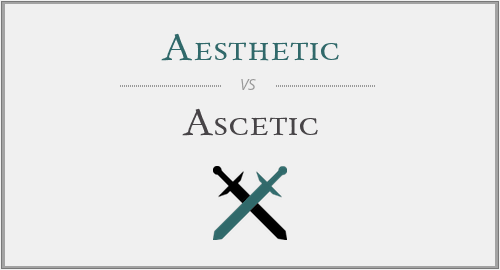Aesthetic and acetic are not exactly homophones but their close resemblance to each other leads to a lot of confusion among English and non-English communities. Consider the examples below:
I think this room is very aesthetic.
She is the most ascetic nun among all.
Can you figure out the meaning of both of these terms by the above sentences? If yes, you are good to go. If not, there is nothing to worry about for 3 in 5 people cannot tell the difference between aesthetic and ascetic. Just keep on reading this article as it will throw light on the origin, meaning and everyday examples of both the words in detail.
Origin:
Aesthetic originated from late 18th century (in the sense ‘relating to perception by the senses’): from Greek aisthētikos, from aisthēta ‘perceptible things’, from aisthesthai ‘perceive’. The sense ‘concerned with beauty’ was coined in German in the mid 18th century and adopted into English in the early 19th century, but its use was controversial until much later in the century. Ascetic originated from mid 17th century: from medieval Latin asceticus or Greek askētikos, from askētēs ‘monk’, from askein ‘to exercise’.
Aesthetic as adjective:
Aesthetic is used as an adjective in English language where it means concerned with beauty or the appreciation of beauty.
The pictures give great aesthetic pleasure.
Giving or designed to give pleasure through beauty is also called aesthetic.
The law applies to both functional and aesthetic objects.
Aesthetic as noun:
Aesthetic is also used as a noun which means a set of principles underlying the work of a particular artist or artistic movement.
The Cubist aesthetic.
Ascetic as adjective:
Acetic is used as an adjective in English language which means characterized by severe self-discipline and abstention from all forms of indulgence, typically for religious reasons.

An ascetic life of prayer, fasting, and manual labor.
Ascetic as noun:
Ascetic is used to describe a person who follows an ascetic life.
Examples:
Partly because of its deep Shinto and Buddhist roots, Japanese culture exhibits a distinctive aesthetic relationship to nature. [Los Angeles Times]
Propaganda apart, supporters admire Gaddafi as a man of the people, an ascetic who can live off dates and milk. [Guardian]
It’s good to know it has value beyond the aesthetic, but to flog my vinyl for spare cash seems the height of desperation. [New Zealand Herald]
There is an ascetic quality about the 44-year-old, with his shaved head and little spectacles, that can make him seem a little stiff. [Sydney Morning Herald]
In the grape debate over which aesthetic reigns supreme, South Africa is the land of wine détente. [Globe and Mail]
An irony shapes this pursuit, and Press’ movie—one that’s based in the gap between Cunningham’s lush work and his weirdly ascetic life. [Slate]
Aesthetic or acetic:
Aesthetic relates to beauty and works of art. Ascetic relates to self-discipline and self-denial. Each works as both an adjective and a noun. An ascetic is a person who renounces material comforts and lives an ascetic way of life. An aesthetic comprises the guiding principles behind a work of art or the appreciation of art. The plural aesthetics refers to the philosophy or study of art and the appreciation of beauty. Both words come from Greek, but their roots are separate. Aesthetic comes from aisthetikos, meaning sense perception. Ascetic comes from asketes, denoting a monk or hermit.




Have a discussion about this article with the community:
Report Comment
We're doing our best to make sure our content is useful, accurate and safe.
If by any chance you spot an inappropriate comment while navigating through our website please use this form to let us know, and we'll take care of it shortly.
Attachment
You need to be logged in to favorite.
Log In